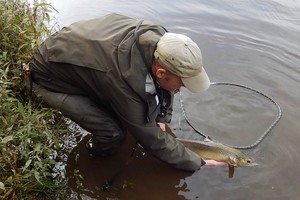A consultation which seeks views on the Environment Agency's proposed new byelaws is open from 5 March 2021 for 4 weeks.
From:
Environment Agency

The Environment Agency is urging anglers, netsmen and interested parties to have their say on proposed new byelaws that aim to protect the salmon and sea trout stocks on the River Severn and Severn estuary.
It is hoped that the proposed new measures,
which will also protect stocks on the River Usk and Wye, will be in place for the next 10 years* and contribute to a reversal of the current decline of returning adult salmon numbers.A consultation which seeks views on the Environment Agency’s proposed measures to better manage salmon fishing on the Midlands rivers opens from 5 March 2021 and runs for 4 weeks.
Evidence shows an international decline in wild Atlantic salmon stocks. This consultation provides the opportunity to express views on the suggested byelaws to improve the chances of salmon survival and further increase numbers that can successfully spawn. Leading to recovery and the long term future sustainability of this iconic species.
The proposed new byelaws would:
Prohibit the operation of the commercial draft net and putcher fisheries, and require the release of all salmon and sea trout caught by the lave nets in the Severn Estuary.
The number of available lave net licences to be set at 22 through a new Net Limitation Order, to allow this heritage method to continue without impacting the fish stocks.
Require mandatory catch and release of all salmon and sea trout caught by rod and line and lave nets.
Restrict angling fishing methods in order to improve the handling and survival of released salmon.
Kevin Austin, Deputy Director of Agriculture, Fisheries and the Natural Environment at the Environment Agency, said:
We are taking decisive action to protect salmon stocks by introducing rod and net fishery byelaws where necessary in order to protect salmon and dependent fisheries.
The decline in the numbers of wild salmon seen not just in English rivers but throughout the North Atlantic is of great concern and we are determined to protect the future of this important species. We must all work together to successfully protect this iconic fish for future generations.
Chris Bainger, Fisheries Technical Specialist at the Environment Agency, said:
It is essential we take urgent action now to prevent any further decline in our salmon stocks. Recent evidence has showed a significant reduction in returning adult salmon to the Severn, and levels are now below the set minimum conservation limits.
Following the introduction in 2019 of emergency regulations for salmon on the River Severn for both rod and net fisheries, the salmon stock is still in decline and fragile. Long lasting measures are now needed to provide greater protection to make sure those fisheries that continue to fish these stocks do so in a sustainable manner to support stock recovery as quickly as possible.
Chris continues:
We are not taking these steps lightly and understand the impact of the proposed byelaws may not be popular with some, but we believe we must act now, before it is too late.
The Environment Agency is encouraging all anglers to review the proposals and participate in the consultation and play a part in the recovery. The next generation should also be able to enjoy the benefits of sustainable salmon and sea trout fishing.
Reducing the taking of salmon is only one part of the Environment Agency’s larger national programme to protect salmon stocks. Actions taken by the Environment Agency and its partners that contribute to protecting salmon stocks include removing barriers, improving water quality, minimising predation and implementing better agricultural practices and addressing unsustainable water abstractions.
*With a review after 5 years.

No comments:
Post a Comment